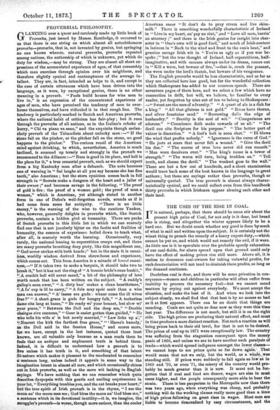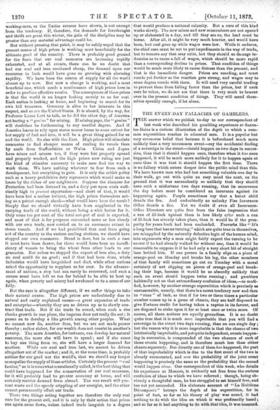THE USES OF THE RISE IN COAL.
IT is natural, perhaps, that there should be some stir about the present high price of Coal, for not only is it dear, but bread also is rising, and altogether the winter appears likely to be a hard one. But we doubt much whether any good is done by much of what is said and written upon the subject. It is certainly not the wisest thing to preach the remedy of a heavy export duty,—which cannot be put on, and which would not remedy the evil, if it were. As little use is it to speculate over the probable speedy exhaustion of our coal-fields, for alarm spread upon that ground could only have the effect of making prices rise still more. Above all, it is useless to denounce coal-owners for taking unlawful profits, for such deminciation will not tend to diminish these profits, so long as the demand continues.
Doubtless coal is dear, and there will be some privation in con- sequence—women and children in particular will often suffer from inability to procure the necessary fuel—but we cannot mend matters by crying out against everybody. We must accept the situation, and make the best of it. And when we look into the subject closely, we shall find that that best is by no means so bad as it at first appears. There can be no doubt that things are mending. Coals are not quite so dear now as they were this time last year. The difference is not much, but still it is on the right side. The high prices are producing their natural effect, and must in time produce a more distinct reaction. Not such a reaction as will bring prices back to their old level, for that is not to be desired. The prices of coal up to 1871 were exceptionally low. The country was suffering from the stagnation consequent upon the money panic of 1866, and unless we are to have another such paralysis of trade—which would spread indigence amongst the lower classes— we cannot hope to see prices quite so far down again. That would mean that not we only, but the world, as a whole, was standing still. If prices were suddenly to fall again so low as in 1869 and '70, or even '71, the misery of the country would pro- bably be much greater than it is now. It must not be for- gotten that if coal and food are dearer, wages are also in most cases higher, and the people consequently more able to bear the strain. There is less pauperism in the Metropolis now than there was two years ago, when everything was cheap, and probably nothing will do the working classes really more good than a time of high prices following on great rises in wages. Moat men are liable to become demoralised by easy circumstances, and the working-man, as the Excise returns have shown, is not exempt from the tendency. If, therefore, the demands for forethought and thrift are great this winter, the gain of the discipline may be greater than any material advantage could be.
But without pressing that point, it may be safely urged that the present course of high prices is working most beneficially for the ultimate good of the country. There is probably good ground for the fears that our coal measures are becoming rapidly exhausted, and at all events, there can be no doubt that had our coal and iron continued cheap, the demand upon our resources in both would have gone on growing with alarming rapidity. We have been the source of supply for all the world almost np to now. But now a change is working, and a most beneficial one, which needs a continuance of high prices here in order to produce effective results. The consequence of these prices is that the world is no longer looking merely to us for coal. Each nation is looking at home, and beginning to search for its own hid treasures. Germany is alive to her interests in this respect, and so are the United States. It is absurd, by the way, for Professor Leone Levi to talk, as he did the other day, of America not having a " genius " for mining. If mining pays, the " genius " will doubtless be forthcoming to any needful degree. And if America learns to rely upon stores nearer home to some extent for her supply of fuel and iron, it will be a great thing gained for us and the world. So also with the East. High prices will stimulate commerce to find cheaper means of coaling its vessels than by coals from Staffordshire or Wales. China and Japan have Alines and miners too, if they were but properly opened and properly worked, and the high prices now ruling are just the kind of stimulus necessary to make men find the way to work them. We have nothing whatever to fear from such a development, but everything to gain. It is only the selfish policy such as a heavy prohibitive duty represents which would make us losers by the riches of our neighbours. Suppose the clamour for Protection had been listened to, and a duty put upon coals suffi- ciently high to prevent exportation—and short of that, it would have been but a useless irritant, the high prices themselves act- ing as a potent enough check—what would have been the result? Simply that we should virtually have been supplanted in the carrying trade of the world, without being a whit better for it. Only some ten per cent. of the total out-put of coal is exported, and most of that is for purposes connected more or less closely with our own trade, now carried on to an enormous extent in steam vessels. And if we had prohibited that coal from going out of the country to the various coaling stations, we should have stopped our own commerce. Bread is dear, but in such a case it must have been dearer, for there would have been an insuffi- ciency of vessels to bring the wheat from other lands to our granaries. But unless we stopped the export of iron also, a duty on coal could do no good ; and if that had been done, whole industries would have languished and died, while other nations seized the opportunity to supplant us for ever. In the advance- ment of nations, a step lost can rarely be recovered, and such a course must have left us too far behind to be able to beat up again, when poverty and misery had awakened us to a sense of our folly.
But the case is altogether different, if we suffer things to take their natural course. The high prices are undoubtedly due to natural and easily explained causes—a great expansion of trade and enterprise—whereby they are so driven ap as to slowly con- tract that trade. But if the trade be sound, when such a rise checks growth in one place, the impetus does not really die out ; it passes on to develop a like growth among other peoples. What we cannot now do, another does, but we are not made poorer thereby ; rather richer, for our wealth does not consist in another's poverty. The more America, for instance, can develop her natural resources, the more she will have to spend ; and if she cease to buy one thing from us, she will have a larger demand for another. While our coal and iron last, we cannot be driven altogether out of the market ; and it, at the same time, is probably neither for our good nor the world's, that we should any longer monopolise the supply of these articles. Certainly the present "coal famine," as it is somewhat sensationally called, is the best thing that could have happened for the conservation of our coal measures, for it will probably lead to greater economy at home, and will certainly restrict demand from abroad. The one result will pre- vent waste and the speedy crippling of our energies, and the other cannot permanently affect our trade.
These two things acting together are therefore the only real cure for the present evil, and it is only by their action that prices can again come down, unless indeed trade languish to a degree
that would produce a national calamity. But a cure of this kind works slowly. The new mines and new economisers are not opened np or elaborated in a day, and till they are so, the load must be borne. After all, it might be very much heavier, and would have been, had coal gone ap while wages were low. While it endures, the chief care mast be not to pat impediments in the way of trade, but to remove any that may exist, lest they should so damage in- dustries as to cause a fall of wages, which should be more rapid than a corresponding decline in prices. That condition of things would be much more likely to cause distress than the present, and that is the immediate danger. Prices are receding, and must recede yet further as the reaction gets strong, and wages may to some degree recede with them. It will need very careful trading to prevent these from falling faster than the prices, but if such care be taken, we do not see that there is very much to lament over in the present condition of things. They will mend them- selves speedily enough, if let alone.



































 Previous page
Previous page